Sally, from Malmsbury, Wiltshire in the UK packed her bags a few years ago to make a new home for herself in a small village near Estoril, Lisbon in Portugal. She works as an English as a Foreign Language teacher and here are some of her latest exploits. If you have ever thought or dreamt about becoming a TEFL teacher, then this may provide some inspiration.
I had an interesting job just after Christmas. I was asked to go to Lisbon to assess the level of English of six candidates for a job with a large insurance company. As it was 9.00 in the morning I decided to take the train. So I got up early, got the bus and then the train into Lisbon. It brought back vivid memories of all those months I commuted from Chippenham to Richmond just outside London, except that stood on a chilly platform at Estoril gazing at a blue sea certainly beat standing on a freezing platform at Chippenham and gazing at a car park with bored seagulls. The crowds negotiating train to metro were just like dear old Paddington but hey, trains coincide with the metro and I was at my appointment at 8.50 – not bad eh?
I really enjoyed the interviewing. They all sat round the table and I kicked off a conversation asking them what they all did – some were very good and articulate but there was the usual “I am better than all the rest” one who got on peoples' nerves. I then asked them to write a letter of application in English applying for the job and giving reasons why they thought they were suitable. This narrowed the field tremendously as although they could speak English well, their written work let them down. I managed to shortlist three with one clear contender and then was very pleased when the HR lady told me I had picked the three she had thought were right for the second stage. Result!
Teaching is still fun – I now have an Argentinean plastic surgeon who wants to move to England and has limited English. Joaquim is 33 and has been in Portugal for three years. His brother is a GP in Patagonia. He wants to have his own clinic eventually back in Argentina but the timing is not right at the moment. He is very keen for people to visit the country as the currency exchange is in our favour and not theirs at the moment. I took him on a practical lesson the other Saturday – a tour of Jumbo supermarket and Cascais fruit and vegetable market – he really enjoyed it.
I have also got a new class at a huge toy store. They are a hoot. They are all in the office and I do two hours with them usually on a Tuesday night. It's nice when you work on site as you get to see them in situ. They are very friendly with a wicked sense of humour and don't want books, just conversation and how to deal with English phone calls. One of my students has a great catchphrase when she doesn't understand – “whattee”. They are very interesting and ask intelligent questions regarding translations of phrases or as last week, the headings on a financial spreadsheet. When the Head of HR is not in the lesson, the questions tend to get more relaxed as in “Miss Sally, tell us some swear words in English”! Body parts are also of great amusement.

Jeronimos Monastery, Lisbon, photo by the Beetle
Jorge, my Siemens student, is constantly keeping me amused – if it's not the latest scandal in football, it's the problems at work and the entertaining saga of getting building permits and planning permission for his new house. He is a real pleasure to teach because he is such fun. In fact the whole office makes me very welcome and they all come over and chat and tell me whether they think he is improving or not. He went to Dresden two weeks ago that meant a couple of German/Portuguese/English lessons – I seem to be learning bits of German as well as Spanish these days.
Last week I gave him a crash course in football reporting – three English articles on Jose Mourinho and Chelsea – very amusing and of great interest to the other guys in the office that wanted to know what he was reading. I was very pleased when he told me that he had tried to read English articles on the plane to Dresden.
Tatiana, my tourism student, is having problems working on essays so we have been trying to break her block. We did a short one last week that was basically a précis of a Portuguese legend from Nazare. I'm hoping that the work we did will give her the confidence she needs. We started meeting in the coffee bar at Jumbo supermarket but the smoke was a pain on days when we couldn't sit outside, so then we moved to Cascais Library, where they have tables and chairs (and resident cat) outside but that got too cold. We then found a very nice pastelaria (Lua da Mel or Honeymoon) but recently she has had problems with babysitters, so we have the class in her flat with her baby daughter, Ayeesha who is very sweet and loves unloading my bag and pinching pencils.


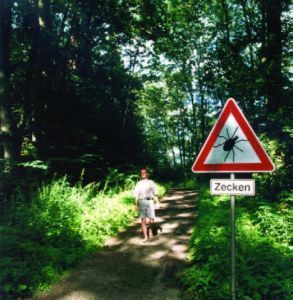 Adventure travel, hiking and mountain biking in Europe are all
increasing in popularity as people discover these new destinations.
Adventure travel, hiking and mountain biking in Europe are all
increasing in popularity as people discover these new destinations.

 We are sorry to
say that Mac is not very well, but he is still e-mailing strong and
recently sent the Beetle a collection of travel reminiscences and
in particular discusses some travel writers. Former Globetrotter
President, Arthur Frommer (Europe On $5 A Day) gave an interesting
interview to travel writer Michael Shapiro for Michael's book,
We are sorry to
say that Mac is not very well, but he is still e-mailing strong and
recently sent the Beetle a collection of travel reminiscences and
in particular discusses some travel writers. Former Globetrotter
President, Arthur Frommer (Europe On $5 A Day) gave an interesting
interview to travel writer Michael Shapiro for Michael's book,
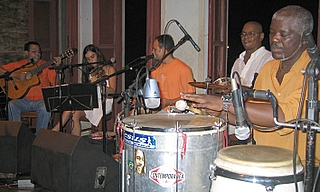 The gentle
sound of Guitars drifting across the tropical air whether it be in
the market square in the borough of Laranjeiras or by the beach in
Ipanema, introduced me to the sound called “Chorinho” –
The crying or weeping of guitars. The music started about the turn of the 20th century and like jazz is free flowing and improvised. The lead instrument is called a
“Cavaquinho”, a small guitar and the music is always
instrumental in form, but many times has a flute or Sax amongst the
various guitars. The undulating but easy listening rhythm is
controlled by the guitars and usually one tambourine.
“Chorinho” fell out of fashion for a time but seems to be
making a come back, especially on Saturday mornings around the
town, where the musicians gather quite a crowd.
The gentle
sound of Guitars drifting across the tropical air whether it be in
the market square in the borough of Laranjeiras or by the beach in
Ipanema, introduced me to the sound called “Chorinho” –
The crying or weeping of guitars. The music started about the turn of the 20th century and like jazz is free flowing and improvised. The lead instrument is called a
“Cavaquinho”, a small guitar and the music is always
instrumental in form, but many times has a flute or Sax amongst the
various guitars. The undulating but easy listening rhythm is
controlled by the guitars and usually one tambourine.
“Chorinho” fell out of fashion for a time but seems to be
making a come back, especially on Saturday mornings around the
town, where the musicians gather quite a crowd.
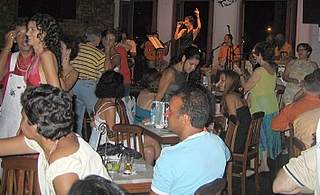 A place not to be missed if you are in Rio is,
“Centro de Cultura do Carioca”. A club or bar in the City
of Rio, near the club land of the district of Lapa, that appeals to
people of all types and ages and has very good Samba, Choarinho,
Popular Brazilian Music and always has a first class group and
singers. 15 R$ (four pounds Sterling) entrance fee and tins of beer
for about 60p each. Caipirinha, a large one costs one pound
fifty.
A place not to be missed if you are in Rio is,
“Centro de Cultura do Carioca”. A club or bar in the City
of Rio, near the club land of the district of Lapa, that appeals to
people of all types and ages and has very good Samba, Choarinho,
Popular Brazilian Music and always has a first class group and
singers. 15 R$ (four pounds Sterling) entrance fee and tins of beer
for about 60p each. Caipirinha, a large one costs one pound
fifty.
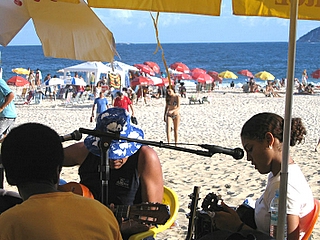 The only tourists, if you could call them that, were
an American Surfing Photographer, who had lived here for four
years, an Argentinean, who had fallen in love, both with Rio and a
girl during Canaval. As the club empted about 3.30 am my friends
and I went to sit by the sea in a district called Leme. A bar
called “Sindicato do Chopp” (Union of the Draft Beers) I
knew it well from a past magazine shoot and there we relaxed and
downed a last drink before that magic hour when the sun rose and my
lovely cool Princess, turned into Sleeping Beauty and I turned back
into a frog.
The only tourists, if you could call them that, were
an American Surfing Photographer, who had lived here for four
years, an Argentinean, who had fallen in love, both with Rio and a
girl during Canaval. As the club empted about 3.30 am my friends
and I went to sit by the sea in a district called Leme. A bar
called “Sindicato do Chopp” (Union of the Draft Beers) I
knew it well from a past magazine shoot and there we relaxed and
downed a last drink before that magic hour when the sun rose and my
lovely cool Princess, turned into Sleeping Beauty and I turned back
into a frog.
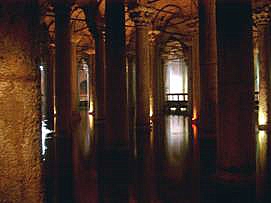

 in the north-western corner, one inverted and the
other on its side; according to mythology, placing her this way
caused her to turn herself into stone. Another theory is that
turning her upside down neutralises her powers. There are some huge
fish too in the water whose function is to aerate the water (and
feed on tourists' handouts). There are signs giving details of
classical concerts that take place in the cisterns. The Basilica
Cistern was restored in 1980 for visitors.
in the north-western corner, one inverted and the
other on its side; according to mythology, placing her this way
caused her to turn herself into stone. Another theory is that
turning her upside down neutralises her powers. There are some huge
fish too in the water whose function is to aerate the water (and
feed on tourists' handouts). There are signs giving details of
classical concerts that take place in the cisterns. The Basilica
Cistern was restored in 1980 for visitors.